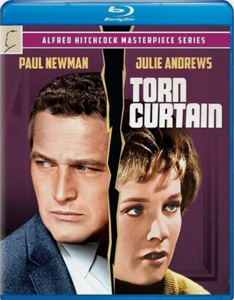A lot of Alfred Hitchcock films are driven by an appealing oddness. “Torn Curtain” (1966) leans more toward an unappealing oddness, leaving it short of greatness. But it has enough individually fine set pieces, and an overall striking portrayal of life in Communist regimes, to earn a mild recommendation from me.
The closest parallel to previous Hitchcocks is “The Man Who Knew Too Much” (1956), as Paul Newman’s science professor Michael hides information from his love interest, Julie Andrews’ Sarah, to an annoying degree. She’s his assistant and fiancée, yet somehow he thinks he can jaunt off to East Berlin without her batting an eye. When she instead follows him, his spy mission only becomes more complicated.
An unusually cold Hitchcock film
“Torn Curtain” has a coldness from the start, when the heat is broken on a cruise ship hosting a retreat of chemists and professors. The water in the glasses at the dinner outright freezes. Even though Michael and Sarah are under the bed covers in their first scene, Newman and Andrews are cold. Both had been iconic in other roles, and here they try to project cautious reserve (Michael) and confusion (Sarah), but they come off as flat and ironically lacking in chemistry.

“Torn Curtain” (1966)
Director: Alfred Hitchcock
Writer: Brian Moore
Stars: Paul Newman, Julie Andrews, Lila Kedrova
Despite using his traditional methods of soundstages combined with rear projection and matte paintings, Hitchcock achieves a sense of place in “Torn Curtain” via the East German villains and the unfortunate citizens living under their rule. These aren’t the traditional robotic East German baddies (like Ivan Drago and his team in “Rocky IV”); they are more chaotically scary.
Most notable is Wolfgang Kieling as the terrifying Gromek. In a purposefully ugly fight scene when Michael gets tracked to a farmstead in his spy schemes, we want Michael and the lady farmer to successfully kill Gromek not only for the sake of their spy plot, but also because Gromek is so awful in the way he taunts them.
Unusually for a Hitchcock film, feelings come before plotting here. Usually Hitchcock would have the hero fairly easily kill the villain and then move on to the next step in the plot, but here the fight scene goes on for a long time. It’s effectively harrowing.
Adding to the unease – perhaps in a way screenwriter Brian Moore (this is a rare Hitch film not drawn from existing source material) didn’t intend – is that Michael’s spy mission is borderline ignoble. He’s working for a secret international group called Pi, and the American government knows nothing about this mission.
The mundane chills of a massive bureaucracy
The mission calls for Michael to steal the East Germans’ formula for an anti-nuclear missile. Sure, the very idea is mumbo-jumbo for the sake of ill-defined moral theorizing. But broadly, the American is stealing a defensive, rather than an offensive, weapon away from East Germany. As such, the line between heroism and villainy becomes blurred.

Although the two lead performances and the lingering scenes of menace undercut it, “Torn Curtain” broadly has a playful “North by Northwest” and “39 Steps” structure. It’s a romp where one bit of narrow success leads to another bit of narrow success, with grave misfortune always looming a step behind Michael and Sarah.
In the abstract, sequences like the bus journey and the ballet-hall escape are classic Hitchcock, as if he wanted to add complexity to the set pieces from “The Man Who Knew Too Much.” Although well-staged, juggling many supporting roles and extras, the increased scope doesn’t create extra impact.
The film doesn’t jell together as a satisfying whole. However, the miscalibrated scenes read as odd more so than boring, and the picture does effectively show the horrors of living behind the Iron Curtain. Our heroes’ worst experience might actually be dealing with a totally unaccountable bureaucracy – like when they try to link up with a contact at a post office, where no one is inspired to help them (although, sadly, this is not much different from dealing with a Western bureaucracy).
“Torn Curtain” is more of a patchwork than I’d like. But if you’re aiming to watch Hitchcock’s whole catalog, you’ll find some secondhand value remains in the movie’s fabric.
RFMC’s Alfred Hitchcock series reviews works by the Master of Suspense, plus remakes and source material. Click here to visit our Hitchcock Zone.

